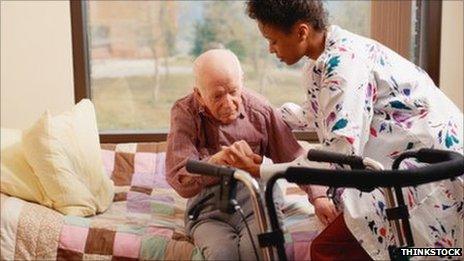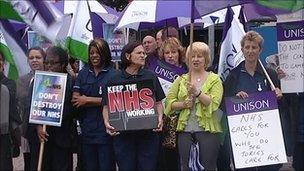Could co-operatives be the future of care?
- Published

Ministers want to turn the NHS in England into "the largest social enterprise sector in the world". They envisage a network of small co-operatives and mutuals run by doctors and nurses not managers. But would that be a good thing? And is it even practical?
"'Public sector' and 'public service' are not interchangeable phrases," says Geoff Walker, chief executive of Sandwell Community Caring Trust.
"I used to have to deliver the 'public sector' with all the management, admin and local politics that come with that. Now all I do is deliver a service - all I have to do now is keep 700 people happy."
Geoff's organisation is a social enterprise that provides care services for adults and children. Since it started in 1997, it has grown from having 85 staff looking after 62 people, to employing 475 for the aforementioned 700.
It's exactly the sort of thing the government wants to see more of - particularly with the number of elderly people growing and the clamour for more early years intervention rising.
It's all part of the Big Society - but just like other aspects of that idea, there are plenty who think it's, at best, impractical - at worst, downright dangerous.
'Mushrooming'
Co-operatives and mutuals are not new - we've banked with them, shopped in them - but they're far from widespread in the health and care sector.
The exact form varies but in general, such organisations are run and owned by their members, control their own funding and direction, and have clear social rather than commercial objectives.
One that is doing well is Ripplez - a not-for-profit enterprise based in Derby which gives intensive support to teenage mothers.
Chris Tully, nurse and midwife turned managing director, says: "There were 10 of us, including seven nurses, and we took a vote on whether we should do it. It was a risk - plenty of people weren't convinced - but we're professionals and we wanted to prove we could do it."
Ripplez is, in Chris's words, "mushrooming" and has just attracted some philanthropic investment.
"We can spend that money how we choose and we're using it to give our parents more involved in what we do," she says.
"The NHS is supposed to do that - give people a say in their care - but it doesn't really, it just pays lip service to it."
Even in Sandwell though, social enterprise isn't universally popular - there were protests when the Primary Care Trust tried to become one - but Geoff Walker is relentlessly positive.

There have been protests against the growth of social enterprise within the NHS
"People always say social enterprises are unproven. Well, we've been doing this for 15 years and it works.
"Three years ago, a local authority was paying £652 a week to deliver elderly care in its own homes, but elsewhere, £328 a week to us to do it for them. We maintained pay, conditions and pension entitlement - the difference is things like sickness rates.
"When we left council control, staff took an average of 22 sick days a year. Now it's less than a day. We've made huge savings simply by making staff feel like they want to come to work. Staff turnover used to be about 40% a year, it's now about 7% - that saves huge amounts in training and recruitment.
"Those two things also really improve quality of care because services are reliable and consistent."
Social 'ecosystem'
Elsewhere in the world, social co-operatives are nothing new.
In Italy, there are more than 7,000, providing everything from care for the elderly and disabled, to jobs for ex-offenders.
Each co-operative is made up of paid staff, users and their families, volunteers and investors. Some or all of those put in their own capital to get it off the ground, but what's absolutely crucial, is the big leg-up that Italian co-operatives get from the system.
They pay reduced corporation taxes, have access to specialist banks and are linked together in consortia so they can wield more clout when tendering for public contracts.
Jonathan Bland, an expert from Social Business International who has advised government on social enterprises, says this sort of "ecosystem" is currently nowhere near existing in the UK.
"There's nothing hugely different, culturally, which means the co-operative model couldn't work here, but big changes are needed to legislation and attitudes.
"At the moment we're in the rhetoric phase - there has to be a lot more work to actually build capacity and there's a vital role for government in taking the lead.
"People need help building up the skills, they need access to capital, tax breaks, and so on. Councils have to change their thinking too because if they just keep on procuring from the same big supplier, small co-operatives will never get a look in.
"In general, nothing is really joined up. It's the government's job to deal with this fragmentation and I don't think they're taking that seriously enough yet."
One of the biggest challenges faced by Italian co-operatives is recruiting senior managers with good business acumen and a social conscience - not least because co-operatives are often seen as offering insufficient status and salaries.
Chris Tully agrees that the right people are key, adding: "You have to really want to make a difference and you've got to have a lot of stamina."
'Back-door privatisation'
While the devolution of power is one of the key tenets of the government's plans for the NHS, it's also one of the most controversial.
The government sees a future in which co-operatives deliver our babies or treat our addictions - some funded by, but independent from, local authorities, others funded by those who use them.
Geoff Walker wants the government to be "bolder" still, and insist that before a local authority closes any health or care service it should have to look at whether a social enterprise could do it instead.
Unions, however, see a deeply worrying fragmentation and monetisation of the NHS - privatisation by the back door.
Christina McAnea, head of health at Unison, has called social enterprises "a leap in the dark that could have damaging implications for patients, staff and the future of the health service".
Unison and the British Medical Association both say the majority of NHS staff aren't keen, and they warn there is nothing to stop a social enterprise ultimately being sold to a profit-making company and prioritising users who are willing to pay - not those in greatest need.
Ultimately, they fear mutuals and co-operatives will fail to survive in a competitive market - and when they do, patients will be left high and dry.
- Published26 May 2011
- Published1 October 2010